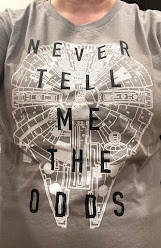Let's start with the out-of-the-blue/what-the-heck first. In September, I talked to a genetic counselor who, for various reasons, decided that she wanted to test me for a rare genetic mutation in addition to the standard breast cancer panel. So we did the test, even though I was a bit annoyed that she was scaring me with the possibility of this when the odds were so low that I had it. But she was right. I have the CDH1 mutation, which not only puts me at high risk for lobular breast cancer but at extremely high risk for diffuse gastric cancer. This freaks me out. Stomach cancers are all aggressive and very bad actors. And it's diffuse, so it's not like they can scan for a mass and find it early. You can do an upper endoscopy with random biopsies, and it just means you don't have cancer in those spots. The default recommendation for this mutation is to remove the stomach. This also freaks me out. How does one live without their stomach? (Apparently, you live just fine. A little complicated, but doable.) And how can I have this genetic mutation when nobody in my family in the last 100 years has had stomach cancer? We determined that the mutation is on my mom's side of the family. I have to admit that I know nothing about my extended family on that side; my sample pool is extremely small. So I've decided to do some digging into my ancestry to see if I can find any cancer on that side. (My great grandfather was diagnosed with stomach cancer back in 1930, but I'm not entirely convinced it's the same. But maybe.) Genetics are fickle. It could be that everybody else lucked out, this mutation only went down the line to me, and certain family members in my direct line died too early for it to manifest. Don't know. But it gives me something to look into while I talk to the medical professionals and decide what to do. In the meantime, we all agree that the more important thing to deal with is the breast cancer.
With regards to the breast cancer, things went pretty smoothly for the most part. I had an outpatient surgery to dissect the lymph nodes in mid-September. (Side note: Having a nuclear dye injected next to each nipple - not fun! Hurts like heck. But it lights up the lymph nodes so that the surgeons know exactly where to go.) They all came back negative for cancer. So I don't need radiation and the reconstruction could proceed as planned. I had decided on the deip flap reconstruction. It involves some vascular microsurgery, but then you have living tissue, and there are no foreign materials in your body. Surgery at the end of September was around 11 hours, but it went swimmingly. All the surgeons were happy. The tests on the tissue surrounding the tumors all came back negative for cancer. My arteries were pumping as they should. I spent two days in the ICU, one day on a regular floor, and then I went home. Yay! I have amazing friends who stayed with me (literally) day and night. But two days after coming home, we noticed a problem. I was in the emergency room first thing the next morning, where I stayed for eight hours until an operating room opened up. I was that extremely rare person - like, 1 in 1,000 - for whom one of the reconstructions failed five days after the surgery. That side was successfully removed, and I was back to recovering at home by the following afternoon (sans the two nerve blocker tubes/bags). A week and a half after that last surgery, the plastic surgeon removed all four drains. I could have hugged him. No more Dr. Octopus. It was awesome.


